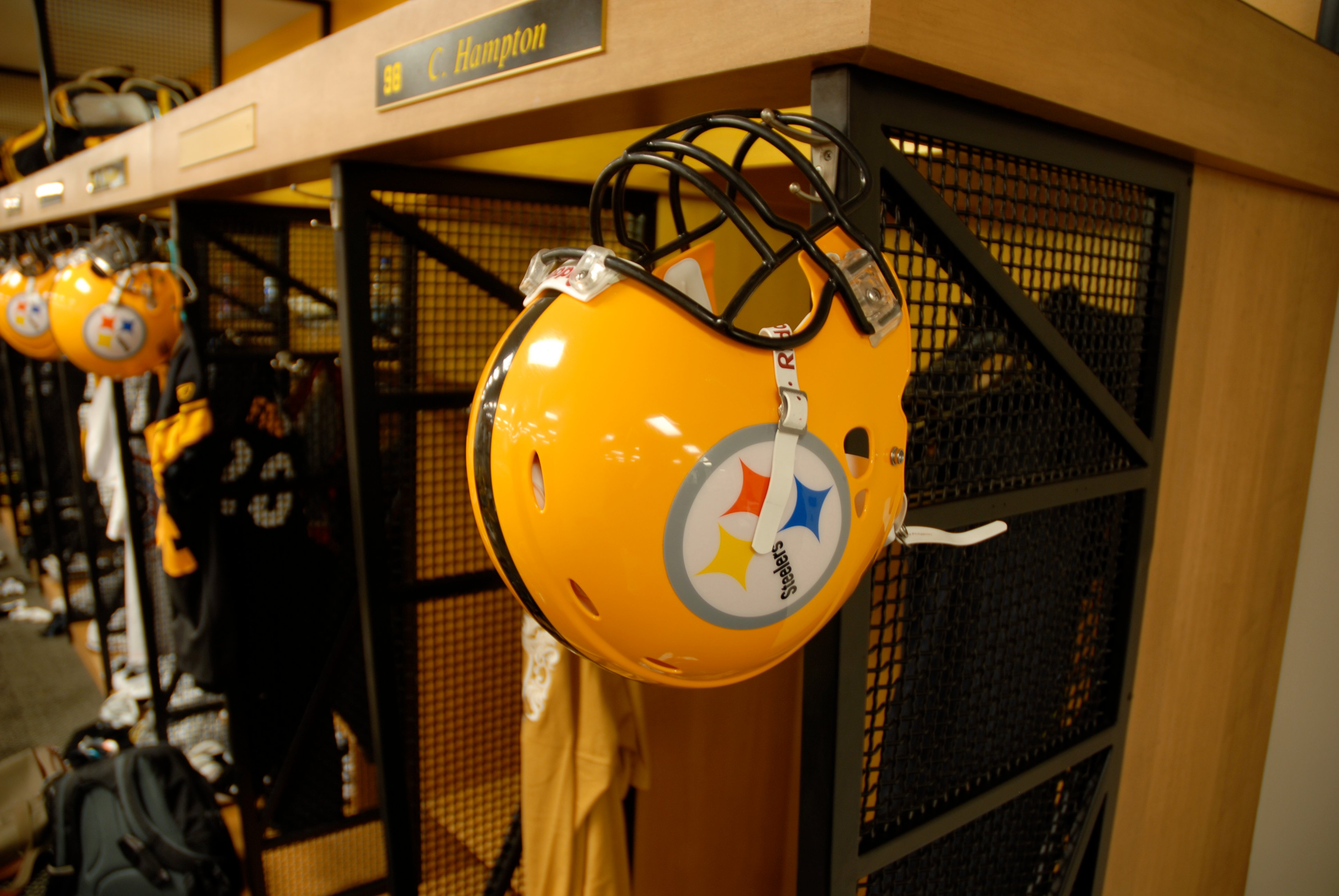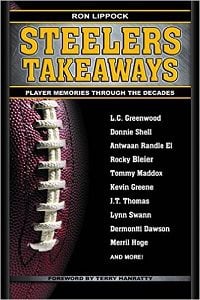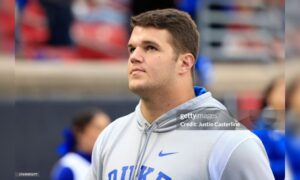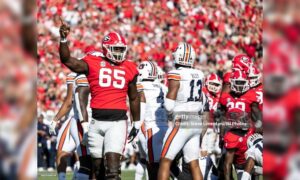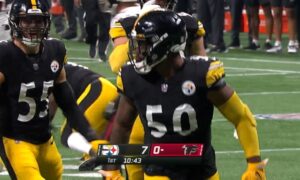Bringing you another Pittsburgh Steelers’ interview courtesy of our good friend Ron Lippock of the Pittsburgh Sports Daily Bulletin. Today, Ron interviews Mark Stock, who played WR for the Steelers in 1989. They talk about his transition out of the NFL, life in the military, and the influence Tom Moore had on his Pittsburgh career.
Be sure to check out Ron’s book, Steelers’ Takeaways: Player Memories Through The Decades, featuring over 400 interviews with players and coaches, past and present. You can buy it on Amazon through the link provided here.
First, can you let readers know what you’re doing with yourself since the NFL?
Ultimately I got into real estate and have been for seventeen years now. Along the way I built homes and was a sports agent for a couple of years until I settled on real estate.
How hard was that transition from football to a post football career?
I have to say I thought it would be an easy transition. I was a walk-on in college. No college recruited me. I was the last player drafted out of VMI and the only one since the 70’s. My dream was to fly for the Navy at first but I had a desire to play in the NFL too. The decision to play football wasn’t easy. I had to give up my flying slot in the Navy to play in the NFL. By the time I retired I was thirty-one and couldn’t go do that after that.
I tried a couple of things. I saw my peers nine years into their careers and felt behind the eight-ball. When you’re thirty-one you feel old!
Looking back at getting drafted by the Steelers, were you surprised to be drafted by them?
It’s funny. I expected to be drafted in the earlier rounds. I was the fourth pick in the sixth round. Back then the first five rounds were on day one so I went to bed undrafted. I knew the Steelers were interested. I took a long run the next morning to burn off some frustration and got a call early the next day. I was excited I had roots there. I was born in Canton, Ohio and my grandfather worked in the steel mills.
Who called you?
Tom Moore called and asked if I wanted to be a Steeler. I said “Absolutely!”
Who helped mentor you during your time there?
As far as the receiving aspect I learned by observing others. I took the aspects of successful wide receivers where I went.
Living well wasn’t the motivation for going to the NFL. I saw it as a way to be able to influence and impact the youth in that position. I talked to the graduate class at VMI after I graduated that December – I taught the PE department – a drug and alcohol awareness course. I talked about Mercury Morris who had those issues then and said he wasn’t a role model. I argued that if you put on the uniform you chose to be a role model.
How did being a military guy impact who you were as a player?
I think my Christian faith informed my attitude. The military discipline absolutely helped me.
I was drafted in 1989 by Tom Moore really – he was responsible for me being there. He was offensive coordinator. When you’re not a coach’s guy, you have to be head and shoulders above the other guys to make the team – for them to get comfortable with you. I was the third down receiver the second half of the season. It was looking good then for my future there.
After that season I had to go to officer’s school in Alabama. Three weeks into that the Steelers brought in a new offensive coordinator, Joe Walton. The Army let me out early so I could learn the new system.
Walton was a big tight ends guys and on third downs wanted to bring in a second tight end, So, I wasn’t one of his guys. Tom Moore leaving didn’t help me. I was one of the last guys cut that year.
It’s funny. That year the USA Today sports section front page had an article during training camp. Desert Shield had started then. They said me, Kevin Greene and one other player could get called to duty any day. That didn’t help me either!
In 1990 I was re-assigned to officer’s class again and I reported on January eighth. January 15th Desert Storm was launched and I was told to keep my bags packed, but I was never deployed.
Any fun stories of your time there in Pittsburgh?
One thing that stood out so vividly. My rookie year in training camp I didn’t know what I was thinking. I thought it would be so much cooler up North in the Summer!
I remember that art some point wondering if I made the wrong decision. I could have been flying an F14…I was tying my shoes and saw Tunch Ilkin, who had been in the NFL then for seven seasons. That seemed like an eternity to me. I asked him what kept him in the league, and he just looked at me and said “Mark, bad investments.” That levity really helped me.
I remember Mark Mularkey commenting to Bubby Brister on how hard he used to throw the ball in practice. He told Mike “Shoot…I haven’t even started lifting weights yet!”
You played for a number of teams across a couple of leagues. Do you think fans get how hard it is for most players to make it?
I think fans understand but at the same time there is an almost mythical quality they assigned to the game.
I saw some genetic phenoms with all of the tools. I was amazed. I played with some great players. But there were some big name, great guys who had a lack of a worth ethic. There were a number if instances where I was shocked at how little they worked. I was amazed at how they were prepared for the game. But then the other guys just trying to make the team. They have to make all of the right decisions and play at 110% peak performance jut to make the team.
What are your thoughts on the issues recently with player protests and the NFL’s relationship with the military?
Well, I have an inter-racial home, with three adopted kids and three countries all under one roof. One of my kids is Black. I understand the conversation and sentiment. But I’m uncomfortable that to a rational mind the flag and national anthem is an appropriate way too protest. There are few things that unify us. To step on one that does…. Well, you see what it does.
It’s all being a part of being a role model. My rookie year Paul Tagliabue was named the commissioner of the league and he came to the teams to do a question and answer session after talking about the league’s new drug policy. It was a three strikes and your out policy. A slap on the hand, suspension, then kicked out of the league.
I remember what I said to him. He talked about Dexter Manley and asked us about the policy. I said I thought it stinks. He asked why, and I said it was way too lenient. We have a duty to the youth of America as role models, I said. Three strikes and your out looks and sounds good, but we needed a zero tolerance policy, I said. One strike and you’re out of the league. Get them the help and support they need but they shouldn’t be allowed to wear the uniform again.
Why?
I think the impact on kids, especially those in the inner city aspiring to play in the NFL, NBA or anywhere. They have the opportunity at ten years old to take drugs and understanding there is no leniency affects their decision-making.
Sports shapes kids for a lifetime. We can’t show them the wrong direction.
Its funny. Bubby Brister nicknamed me “One-Time Stock” after that.
Any thoughts on what players entering the league need to do to prepare?
Like I tell the kids, like in the ancient book, walk with the wise and grow wise. Keep the company of fools and all is destroyed.
Seek out good people. Those that model a good career and have qualities that model a good life.

